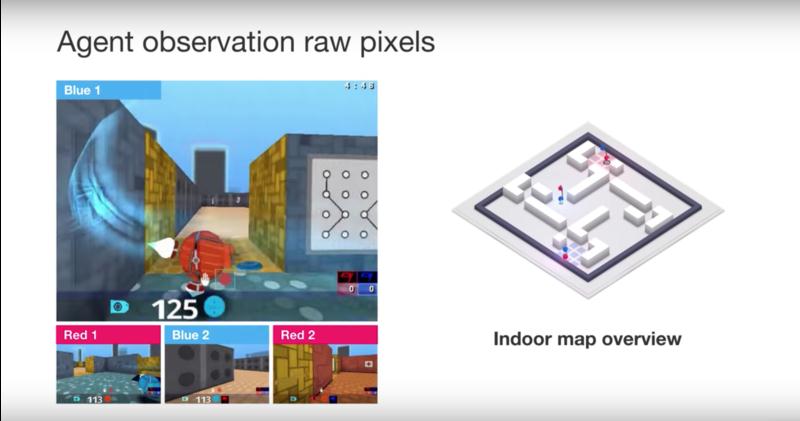不滿足于圍棋,,DeepMind人工智能又成游戲高手

|
兩年前,,DeepMind創(chuàng)造的人工智能在圍棋上打敗了世界冠軍,一舉占據(jù)了新聞頭條,。如今這家Alphabet子公司的另一個程序又掌握了流行的多人電子游戲《雷神之錘》(Quake)的玩法,。 DeepMind于上周二表示,他們開發(fā)的創(chuàng)新和強化學(xué)習(xí)技術(shù),,可以讓人工智能系統(tǒng)在《雷神之錘3:競技場》(Quake III Arena)奪旗戰(zhàn)中的表現(xiàn)達到人類玩家的水平,。 DeepMind表示,之所以讓人工智能學(xué)習(xí)玩奪旗戰(zhàn),,是將此當作一項練習(xí),。在這一游戲中,它們需要獨立行動,,并學(xué)會互相配合,。DeepMind在博文中表示:“這是一項極其艱巨的難題,因為在它們不斷合作的同時,,地圖也在不斷發(fā)生變化,。” 《雷神之錘3:競技場》是一款第一人稱射擊游戲,,規(guī)則很簡單:兩個團隊要保護自己的旗幟,,奪取對手的旗幟,但最后的結(jié)果可能很復(fù)雜,。游戲要求玩家(按照人工智能領(lǐng)域的說法,,叫智能體)與團隊成員合作,在一系列不斷變化的地圖中與對手競爭,。 DeepMind表示,,智能體從未接受過關(guān)于游戲規(guī)則的指導(dǎo),但它們卻能以“非常高的水平”掌握游戲,。在一場由人工智能玩家與40位人類玩家隨機混合組隊的錦標賽中,,人工智能玩家迅速掌握了竅門,勝率超越了人類玩家,。更可怕的是,,人類玩家認為人工智能玩家在合作度上優(yōu)于人類隊友,。 DeepMind在博客上寫道:“實際上,智能體會學(xué)習(xí)類似人類的行為,,例如跟隨隊友,,并在對手的基地安營扎寨??傮w來說,,我們認為這項工作凸顯了多智能體訓(xùn)練在促進人工智能發(fā)展上的潛力?!保ㄘ敻恢形木W(wǎng)) 譯者:嚴匡正? |
Two years ago, DeepMind drew headlines by creating an AI system that defeated the world champion of the game Go. Now another program at the Alphabet subsidiary has learned how to play the popular multiplayer video game Quake. DeepMind said last Tuesday that it had developed innovations and reinforcement learning that enabled an artificial-intelligence system to achieve human-level performance in Quake III Arena’s Capture the Flag, a 3-D first-person multiplayer game. DeepMind said that learning to play Capture the Flag was intended as an exercise in which several individual agents must act independently, while learning to interact incorporate with each other. “This is an immensely difficult problem — because with co-adapting agents the world is constantly changing,” DeepMind said in a blog post. Quake Arena III is a first-person shooter video game with simple rules — two teams protect their own flag while seizing that of their opponent — but also the potential for complex outcomes. The game requires players (or in AI parlance, agents) to cooperate with team members while competing with others amid a changing variety of maps. The agents were never instructed about the rules of the game, yet were able to learn the game “to a very high standard,” DeepMind said. In a tournament randomly mixing AI agents with 40 human players, the agents quickly learned to exceed the win rate of their flesh-and-blood counterparts. Even scarier, human players rated the agents as more collaborative teammates than other humans. “Agents in fact learn human-like behaviors, such as following teammates and camping in the opponent’s base,” DeepMind said on its blog. “In general, we think this work highlights the potential of multi-agent training to advance the development of artificial intelligence.” |
-
熱讀文章
-
熱門視頻











